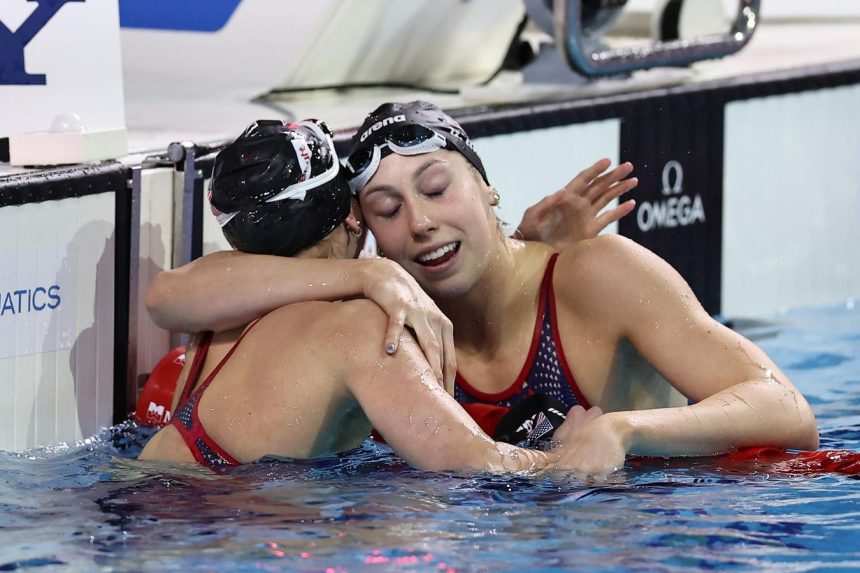The 2024 Short-Course World Championships, held in Budapest’s Duna Arena, concluded on December 15th, leaving an indelible mark on swimming history. The meet witnessed an unprecedented wave of record-breaking performances, with 30 world records shattered over the six-day competition. The influx of elite long-course swimmers making their short-course debuts contributed to the exceptional results, elevating the championships to a legendary status within the sport. The meet showcased a blend of established stars solidifying their dominance and emerging talents announcing their arrival on the global stage.
Gretchen Walsh, a 21-year-old University of Virginia senior, emerged as a dominant force, capturing eleven world records, nine of which were individual achievements, in her short-course championship debut. Walsh’s prowess in the butterfly events was particularly noteworthy. She repeatedly broke the world record in both the 50-meter and 100-meter butterfly races, demonstrating her exceptional speed and technique. In the 50-meter event, she bested the existing super-suited record in the prelims and further lowered it in the semifinals, ultimately winning gold. Her performance in the 100-meter event was equally remarkable, breaking the world record three times, culminating in a gold medal-winning time of 52.71 seconds. These achievements solidify Walsh’s position as a leading force in butterfly, holding the fastest times across long-course, short-course, and yards formats.
Jordan Crooks, a 22-year-old Caymanian swimmer, etched his name in history by becoming the first man to break the 20-second barrier in the 50-meter freestyle. His semifinal time of 19.90 seconds surpassed even the unofficial times achieved by multiple Olympic gold medalist Caeleb Dressel in a faster swimsuit. Crooks’ accomplishment underscores the continuous evolution of speed in swimming and highlights his exceptional sprinting abilities. He also lowered Dressel’s official world record in the prelims and secured a bronze medal in the 100-meter freestyle, cementing his status as one of the sport’s premier sprinters.
Canadian sensation Summer McIntosh, at just 18 years old, continued her meteoric rise, capturing three gold medals and breaking three world records. McIntosh dominated the 400-meter individual medley, obliterating the previous world record and showcasing her versatility. Her victories in the 400-meter freestyle and 200-meter butterfly, both achieved in record-breaking times, further emphasized her well-rounded skill set and established her as a dominant force across multiple events. McIntosh’s focus on refining her butterfly stroke contributed to her success, highlighting the importance of continuous improvement even at the highest level of competition.
Regan Smith, under the tutelage of renowned coach Bob Bowman, asserted her dominance in backstroke events, sweeping all three distances. She broke the world record in the 100-meter backstroke multiple times leading up to the championships and further solidified her dominance in Budapest. Smith’s record-breaking swim in the mixed medley relay, though unofficial, demonstrated her exceptional speed and consistency. She followed this with world record performances in the 50-meter and 200-meter backstroke events, completing the backstroke sweep and cementing her legacy as one of the all-time greats in the discipline.
Noe Ponti of Switzerland showcased his mastery of the butterfly stroke, breaking world records in both the 50-meter and 100-meter events. He progressively lowered the 50-meter butterfly world record throughout the World Cup season and culminated his efforts with two more record-breaking swims in Budapest. In the 100-meter event, he surpassed Caeleb Dressel’s previous record, highlighting his emergence as a top contender in the butterfly events. Ponti’s consistent improvement and ability to perform under pressure signify his potential for future success.
Kate Douglass added to the record-breaking frenzy, setting new global marks in the 200-meter individual medley and the 200-meter breaststroke. She finally achieved her long-standing goal of breaking the 200-meter IM world record, surpassing a mark that had stood for several years. Douglass also successfully defended her 2022 title in the 200-meter breaststroke, lowering her own world record in the process. Her double victory and record-breaking performances underscore her versatility and confirm her status as a dominant force in both medley and breaststroke events.



